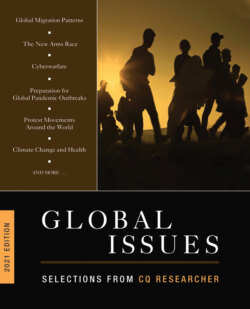Читать книгу Global Issues 2021 Edition - Группа авторов - Страница 84
Pressure for New START
ОглавлениеMeanwhile, lawmakers are stepping up pressure on the Trump administration to extend New START, introducing bipartisan legislation in both chambers that would strengthen a requirement to assess the costs and implications of allowing the treaty to expire next February.
With Trump still unwilling to commit to the pact’s extension in order to explore including China, the House and Senate bills would require the administration to provide intelligence estimates on how much Russian and Chinese nuclear forces could expand if New START expires. Lawmakers also want to know how much it would cost for U.S. intelligence to ascertain such developments without an extension of New START’s verification provisions.
The bills echo a provision in the new fiscal 2020 National Defense Authorization Act, which requires the administration to estimate how large Russia’s tactical nuclear arsenal and China’s nuclear modernization program will grow if New START is allowed to lapse.65
Congressional aides say the legislation reflects serious concerns on Capitol Hill that the administration has not sufficiently analyzed the strategic implications of allowing New START to expire. Moreover, lawmakers from both parties and arms control experts say they are unaware of any concerted administration effort to formulate a negotiating strategy for China.
Countryman, the former assistant secretary of State for international security and nonproliferation, notes that while Trump announced his plan for a tripartite arms control treaty last May, the State Department only invited China to begin what it called a bilateral “strategic security dialogue” in December. “After saying they wanted to negotiate with China, it took them nine months to officially communicate that,” he says.
State Department officials will not say whether China has responded to its invitation, but Beijing repeatedly has said it has no interest in three-way nuclear arms reduction talks, because the Russian and U.S. arsenals are already 20 times the size of China’s.
In February 2020, national security adviser Robert O’Brien said the Trump administration would soon open nuclear arms control negotiations with Russia. His remarks came 10 months after Secretary of State Mike Pompeo told lawmakers the administration was at the “very beginning of conversations about renewing” New START, indicating it had made no serious diplomatic efforts in the interim.66
With the administration struggling to deal with North Korea and Iran, some arms control experts suggest it may not have the bandwidth to focus on Trump’s trilateral treaty proposal. The State Department’s Office of Strategic Stability and Deterrence Affairs, responsible for negotiating arms control treaties, reportedly has gone from having 14 staffers when Trump took office in 2017 to four. The State Department’s top two arms control officials were among those who left, says Bell, the former State Department arms control adviser, and neither has been replaced. The State Department has not commented on the report.
“We simply don’t have enough people doing this,” says Bell, now the senior policy director at the Council for a Livable World, a Washington-based organization that advocates for nuclear disarmament. “To create these kinds of agreements, you need patience and high-level, disciplined attention paid to those goals. It’s hard to see that forthcoming from this administration.”
And without the robust verification procedures allowed by New START, it would cost billions of dollars to create new intelligence programs to determine the disposition of Russia’s nuclear arsenal, with no guarantees that such programs would succeed, say former arms control officials. The treaty’s expiration also would remove any restrictions on the numbers of new hypersonic nuclear weapons Russia could deploy, experts say.
“It is hard to overstate, from my perspective as a senior military leader, how much we benefit from the knowledge and predictability the treaty provides about Russia’s nuclear forces and operational practices,” Mullen, the former Joint Chiefs chairman, told the House Foreign Affairs Committee in December 2019. “Without the treaty and its verification provisions, we’d be flying blind.”67
